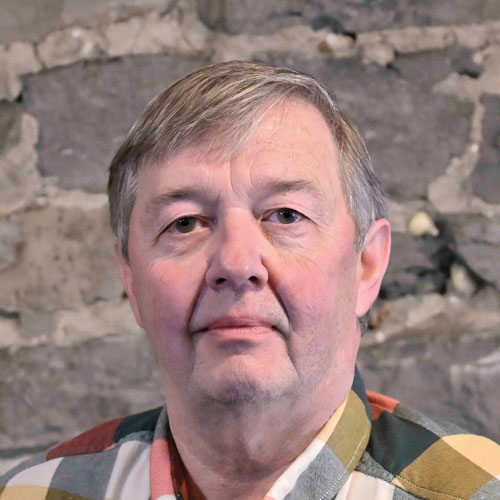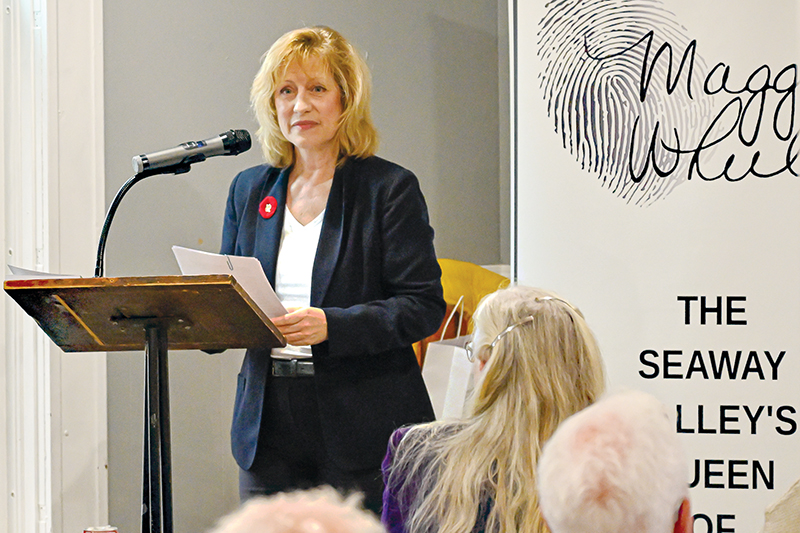Maggie Wheeler launched The Last Wave By, the seventh and final installment in her Lost Villages Historical Murder Mystery series Sunday afternoon at the Canadian Legion on Frost Avenue in Long Sault. Tinkess Photo
Maggie Wheeler, the Seaway Valley’s “Queen of Crime” launched The Last Wave By, the seventh and final installment in her Lost Villages Historical Murder Mystery series Sunday afternoon at the Canadian Legion on Frost Avenue in Long Sault.
The series, which expertly weaves fact and fiction is based upon the activities of Farran Mackenzie, as the main protagonist and the Lost Villages, the group of vibrant communities wiped from the face of the earth because of the construction of the St. Lawrence Seaway.
For Wheeler, it has been a 21-year journey that sadly must come to an end. After so long, it must have felt like saying good-bye to an old friend.
“Absolutely, to a lot of old friends,” said Wheeler. “It was a very difficult decision to make. I think it is the right one, it’s a good place to wrap it up. I’m starting to have the (Agatha) Christie problem where all my characters are getting older, so they can’t run after speeding cars, or flip out of windows anymore. Not that there was action a lot, but it was there, and they are all getting into their 70s and so on. I think they’re ready to retire. I’m not, but they are.”
With historical fiction, an author needs to put almost as much effort into the research as into the creative aspect of the writing. For devoted readers of the series (and there are many) the characters have developed a life of their own. Wheeler was asked if she ever feels like it was less about creating story lines than taking dictation from her characters?
“It’s kind of both. I’ve been asked many times over the years, like at writing classes in high schools and stuff: do you plan out every chapter and every scene, because there are writers that do that. I’d say a lot of writers do, but it’s not my way.
“What I do is get a general idea about what the story is going to be about, and it must be also about who is going to kill who and for what reason, because that must go in the bottom, and then I just start moving in, it’s from A to Z that I don’t know, it’s foggy. I make my way through, and the characters start to tell me what is going to happen, and I follow them. With this last one it’s a dead run, because they are all involved, not just Farran (Mackenzie), so I’ve been going in all these different directions, but they did it.”
According to Wheeler, she was inspired to begin writing about The Lost Villages because it struck her as strange that so many people would not talk about this life-altering event. “Just the fact that I’d grown up in Long Sault, surrounded by people who, less than a decade before had gone through that tremendous project and nobody was talking about it,” said Wheeler. “I found this out when I was in my adult years, and I remember thinking that this is something that doesn’t happen every day, and you don’t have a whole community in silence every day, and now we have words for that, it’s called trauma, lack of closure, all those things but back then you didn’t talk about it. You just picked up and kept going.”
Wheeler says she has no immediate plans other than taking a break and enjoying some personal time. “Hibernation, intense personal hibernation for a little while. I’m going to take a break. Next year I have no planning wall. I have one thing on my wall for next year and that is my daughter’s wedding. We’ve got the first of my three girls getting married next year and that is all I’m planning, that and a vacation after it. The rest, we’re just going to see what life does, just for a year.”

Terry Tinkess is a professional photographer, educator and journalist. He has been making a living with a camera and keyboard since 1999 and has been featured in such publications as The Ottawa Citizen, Cornwall Standard Freeholder, The Globe and Mail, The Miami Herald, Ottawa Construction News, The Ontario Construction Report, Ontario Home Builder Magazine, Reed Construction Data, Canadian Potato Business and most recently, The Record and Eastern Ontario AgriNews. Terry lives in Ingleside, Ontario with his wife Brenda, Mia the anxious Pittie and cats Wally and Chubbers.











